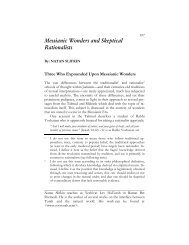Is There a Disconnect between Torah Learning and ... - Hakirah.org
Is There a Disconnect between Torah Learning and ... - Hakirah.org
Is There a Disconnect between Torah Learning and ... - Hakirah.org
Create successful ePaper yourself
Turn your PDF publications into a flip-book with our unique Google optimized e-Paper software.
36 : Hạkirah, the Flatbush Journal of Jewish Law <strong>and</strong> Thought<br />
actually, “we don’t fir zich like this” (we do not follow this ruling), the<br />
lesson is in effect erased from the child’s mind.<br />
Years ago my son asked me at the Shabbos table, “Tati, why must<br />
we hate goyim?” I asked him where he had gotten this idea. He<br />
answered, “My rebbe said so.” I would have been disturbed by this<br />
“lesson” under any circumstances, but I was even more surprised<br />
because that Friday afternoon my son had brought home his lesson<br />
from the Derech Eretz program. It taught about kavod ha’briyos,<br />
complete with the anecdote about how Rebbe Yaakov Kaminetzky<br />
ztz”l interrupted a conversation he was having on the street to pay<br />
silent respect to a non-Jewish funeral that was passing by, saying<br />
that the dead person too was created in the אלוקים ,צלם image of<br />
Hashem. How, I wondered, did the same rebbe teach the two lessons<br />
in the same day or week? I did not wonder about which lesson had<br />
“taken.” That was unfortunately obvious.<br />
Thus, of primary importance in teaching middos is authenticity;<br />
we must mean what we teach <strong>and</strong> preach. But it must go further than<br />
that.<br />
Empathy:<br />
One of the critics of Kohlberg’s approach was Hoffman. 39 He<br />
emphasized <strong>and</strong> cited research to show that Moral Development <strong>and</strong><br />
Behavior were strongly dependent on an underst<strong>and</strong>ing of <strong>and</strong><br />
identification with the feelings of other human beings, especially<br />
those who are suffering. He argued that it is by this empathic distress<br />
(known in our own literature as being בצער חבירו ,(משתתף feeling<br />
another human being’s pain, rather than just moral thinking, that we<br />
are moved to altruistic behavior, to helping that person. Similarly, it is<br />
the sensitivity to the realization that our words or actions may<br />
embarrass <strong>and</strong> hurt another person, that may cause us to be careful<br />
of what we say.<br />
39 Hoffman, Martin L., “Toward a Comprehensive Empathy-Based<br />
Theory of Prosocial Moral Development” in Bohart, Arthur C. (Ed);<br />
Stipek, Deborah J. (Ed), Constructive & Destructive Behavior: Implications for<br />
Family, School, & Society, (pp. 61-86). Washington, DC, US: American<br />
Psychological Association (2001).
















